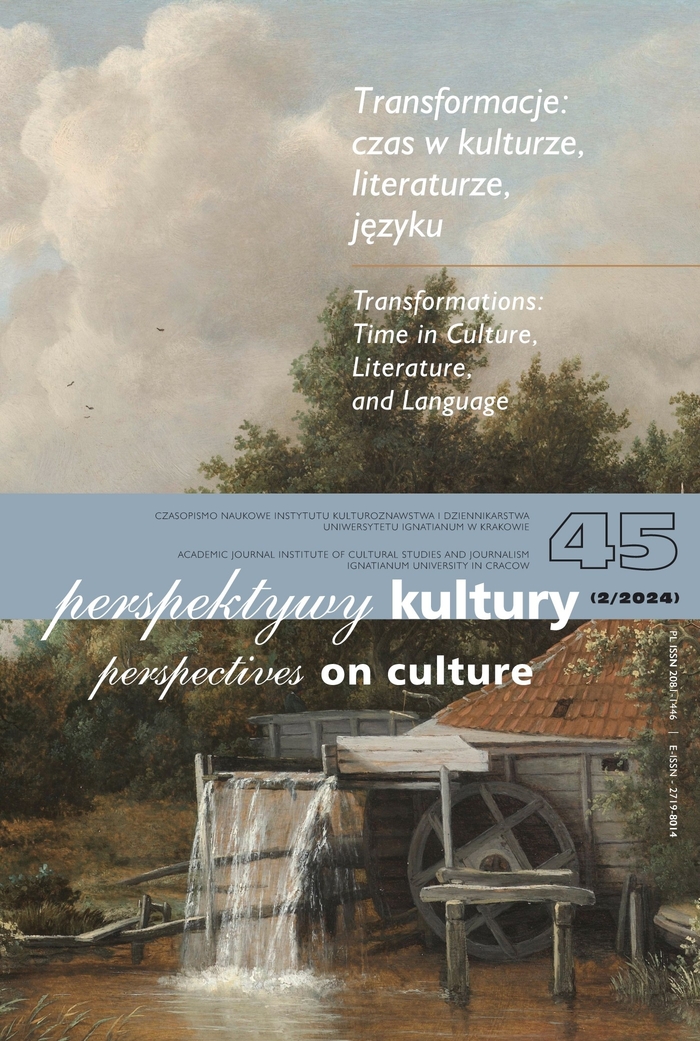Time of Agreements in Joseph Conrad’s An Outcast of the Islands
Abstract
This article examines the temporality of human agreements on the basis of Joseph Conrad’s novel, An Outcast of the Islands, and in reference to John M. Taggart’s thesis about the unreality of time. The execution of contracts is a mastery over time, but since, as Conrad’s contemporary, the philosopher J.M. McTaggart proclaimed in his work The Unreality of Time, time is not part of the real world, contracts cannot be so either. Commercial contracts, civil contracts, gentlemen’s agreements, and marriage contracts – although they concern very specific matters that are fraught with consequences and they are a kind of farce precisely because of their temporal aspect. Making alliances and taking up responsibilities turns out to be, in the light of McTaggarts’s theory, not only a contractual, but also hazardously ambivalent action, because it never stops time, nor does it lead to eternal duration, but contradicts it entirely. From such a perspective, knowledge of the explicit and hidden terms of the contract becomes more important than the struggle for its duration.
References
Bergson, H. (1910) Time and Free Will: An Essay on the Immediate Data of Consciousness. Trans. F. L. Pogson. London: Allen & Unwin.
Bernstein, J. A. (2012). “‘No Audible Tick’: Conrad, McTaggart, and the Revolt against Time.” The Conradian, vol. 37, no. 1, pp. 32–45. JSTOR, http://www.jstor.org/stable/23264493. Accessed 11. March 2023
Conrad, J. An Outcast of the Islands. (2016). Ed. Allan H. Simmons. The Cambridge Edition of the Works of Joseph Conrad. Cambridge: Cambridge University Press.
Davies, L. (2017). Introduction and Notes. [In:] Wells, H. G. The Time Machine and Other Works. Ware, UK: Wordsworth Editions.
Henderson, L. D. (1983). The Fourth Dimension and Non-Euclidean Geometry in Modern Art. Cambridge: The MIT Press.
Lothe, J. (1989). Conrad's Narrative Method. Oxford: Clarendon Press.
Martin, J. J. (1974). EDWARD GARNETT AND CONRAD’S RESHAPING OF TIME. Conradiana, 6(2), 89–105. http://www.jstor.org/stable/24641846 Accessed 11 March 2023
McTaggart, J.E. (1893). “Time and the Hegelian Dialectic”. Mind, 2(8): 490–504.
McTaggart, J.E. (1908). “The Unreality of Time”. Mind, 17(68): 457–474.
Najder, Z. (2007). Joseph Conrad: A Life. Translated by Halina Najder. New York: Camden.
Peters, J.G. (2000). Joseph Conrad’s “Sudden Holes” in Time: The Epistemology of Temporality. Studies in the Novel 32 (4), 420-441. http://www.jstor.org/stable/29533413 Accessed 11. March 2023
Throesch, E. L. (2017). Before Einstein: The Fourth Dimension in Fin-de-Siècle Literature and Culture. Anthem Nineteenth-Century Series. https://www.jstor.org/stable/j.ctt1jktqh1.4 Accessed 11. March 2023
Tooley, M. (ed.) (1999). Time and Causation. Analytical Metaphysics Series. New York&London: Garland Publishing Inc.
Copyright (c) 2024 Perspectives on Culture

This work is licensed under a Creative Commons Attribution-NoDerivatives 4.0 International License.
Autor, zgłaszając swój artykuł, wyraża zgodę na korzystanie przez Wydawnictwo Uniwersystet Ignatianum z utworu na następujących polach eksploatacji:
- utrwalania utworu w formie papierowej, a także na nośniku cyfrowym lub magnetycznym;
- zwielokrotnienia utworu dowolną techniką, bez ograniczenia ilości wydań i liczby egzemplarzy;
- rozpowszechniania utworu i jego zwielokrotnionych egzemplarzy na jakimkolwiek nośniku, w tym wprowadzenia do obrotu, sprzedaży, użyczenia, najmu;
- wprowadzenia utworu do pamięci komputera;
- rozpowszechniania utworu w sieciach informatycznych, w tym w sieci Internet;
- publicznego wykonania, wystawienia, wyświetlenia, odtworzenia oraz nadawania i reemitowania, a także publicznego udostępniania utworu w taki sposób, aby każdy mógł mieć do niego dostęp w miejscu i czasie przez siebie wybranym.
Wydawca zobowiązuje się szanować osobiste prawa autorskie do utworu.





